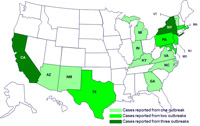The CDC has announced an investigation of three multistate outbreaks of salmonellosis linked to pet turtles. At last report, 66 affected people had been identified, and since most outbreaks like this only identify a minority of cases, it’s safe to assume there are many others.
- Three different types of Salmonella have been implicated; S. Sandiego, S. Pomona and S. Poona.
- Infected people have been identified in 16 US states (see map).
- 11 people have been hospitalized, but no one has died.
- Most cases (55%) have involved children under the age of 10.
- Almost all infected individuals who provided information about turtle contact with said the turtles were less than 4 inches long.
This ongoing outbreak, dating back to September 2011, has all the hallmarks of a pet turtle-associated outbreak: a large number of cases over a wide area and prolonged period of time, a predilection for young children, and the potential for severe disease. While far from novel, this outbreak also highlights some recurring themes.
The potential for widespread outbreaks from mass production and distribution of pets has been repeatedly demonstrated with a range of diseases, including recent examples involving chicks and guinea pigs. That doesn’t mean that mass production is necessarily higher risk (although it certainly can be), but when something goes wrong, it can go very wrong because of the large number of infectious animals that get sent out.
Sale of turtles with shell lengths under 4 inches has been banned in the US since 1975. This is because small turtles are more likely to be handled (and potentially put in the mouth) by young kids. Despite extensive lobbying by US turtle breeders, the law remains in effect, but it’s widely flaunted. It’s surprising more efforts aren’t put into enforcing this regulation given the number of people who are sickened every year from contraband turtles. (It’s also surprising that infected people in the US haven’t started large lawsuits against people distributing small turtles.)
Anyway, this is yet another reminder about the risks associated with reptiles and high risk individuals (i.e. young children, elderly, pregnant, immunocompromised) and the need for pet turtle owners to follow basic hygiene and infection control practices. More information about turtles – for owners, veterinarians and healthcare professionals – can be found on the Worms & Germs Resources page.